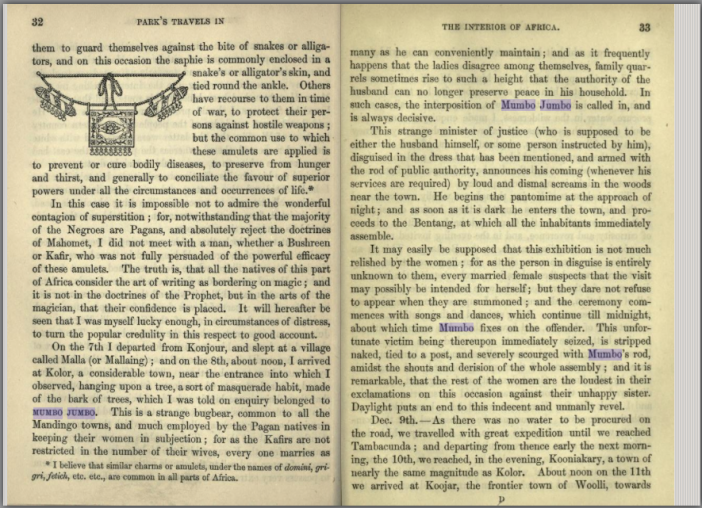Last week, the Ringling Brothers and Barnum & Bailey Circus announced that it is finally retiring its elephant act. Perhaps the circus’s most famous elephant was Jumbo, whom Barnum bought from the London Zoo in 1882 with much hullabaloo. Jumbo’s legendary size lives on in the legacy of his name. Jumbo cigars fill our mouths and jumbo jets fill the sky. We gulp jumbo-sized sodas in our stadium seats as jumbotrons fill our eyes. So, let’s size up the origin of jumbo.
Jumbo
From West Africa to England, from Arabian hunters to Italian animal traders, from Prussian menageries to American circuses, Jumbo’s incredible and outsized story may be well known, but the etymology of jumbo is certainly not.
In short, we aren’t exactly sure who named Jumbo, why, and what the name precisely means. Some argue that Jumbo was named for a Zulu word for a “large packet” or “large parcel”; others, for the Swahili for “hello” (jambo) or “chief, boss” (jumbe). Also cited is a Kongo word, nzamba, apparently a word for “elephant,” though nzombo has been glossed by Daniel Webster as “python,” according to Eric Partridge. Yet others argue that Jumbo is taken from a 19th-century slang term, jumbo, originally referring to a big and clumsy person–which word may be derived from another proposed origin of the elephant’s name, mumbo-jumbo.
Let’s have a look. Be advised: the record of jumbo and mumbo-jumbo I am presenting does preserve some historical sexist, racist, and colonial attitudes.
The earliest citation that the Oxford English Dictionary provides for the word jumbo comes from the pseudonymous John Bee’s 1823 slang dictionary, whose title is jumbo in its own right:
Slang: A Dictionary of the Turf, the Ring, the Chase, the Pit, of Bon-ton, and the Varieties of Life, Forming the Completest and Most Austhentic Lexicon Balatronicum Hitherto Offered to the Notice of the Sporting World, for Elucidating Words and Phrases that are Necessarily, or Purposely Cramp, Mutative, and Unintelligible, outside their Respective Spheres, Interspersed with Anecdotes and Whimsies, with Tart Quotations, and Rum-ones; with Examples, Proofs, and Minority Precepts, Useful and Proper for Novices, Flats, and Yokels.
In his dictionary, Bee defines jumbo as a “clumsy or unwieldy fellow.” His entry, moreover, takes the word back to Mumbo Jumbo, the name of a spirit of the Mandingo (or Mandinka, an extensive West African ethnic group), who, apparently, would emerge from the woods in a mask, howling, to tie up and beat quarrelsome wives. Here is the full text of Bee’s entry:

Mumbo-jumbo
As we saw, Bee refers to Scottish explorer Mungo Park’s 1799 Travels in the Interior of Africa. Here are Park’s remarks on this Mumbo Jumbo:

The Mumbo Jumbo, then, appears to be a kind of ceremonial masked dancer endowed with divine powers and enforcing patriarchal order in the tribe.
However, the OED first records mumbo-jumbo yet earlier, in Francis Moore’s 1738 Travels to the Inland Parts of Africa. He first describes the term as a kind of mystifying “cant language,” much like its sense of “meaningless jargon” today:

Later, Moore uses “Mumbo-Jumbo” in reference to the figure, not the cant language, giving us more detail about this “mysterious idol,” this “bugbear of wives”:

Now, some scholars have reconstructed from Mumbo-Jumbo the Mandingo maamajomboo, which the OED glosses as “mask” or “masked dancer.” Others, like Webster in his New International Dictionary, have reconstructed Mama Dyumbo (or Dyambo), breaking down the first part to “ancestor” and the second part, “pompon” (think, “pom-pom”). Together, we can see how the terms add up to “masked dancer.”
Is this origin of mumbo-jumbo mumbo-jumbo? Whatever the case, the word displays a kind rhyming reduplication English is fond of, as seen in argle-bargle or namby-pamby or super-duper. The expression also mimics mumble and jumble, with sound mirroring sense.
Further, is the ultimate root of jumbo some jumbo mumbo-jumbo? Etymology can seem to be so, but regardless of the origin of his name, Jumbo the elephant’s great size definitely trumpeted the future course of the word jumbo.
Barnum being Barnum, I wouldn’t discount the possibility that he simply liked the exotic sound of the syllables.
LikeLiked by 1 person
Jumbo probably got his name before Barnum bought him, but we can never underestimate, never discount, the sheer power of sound in words and names. You make a great point.
LikeLike
It’s curious that most of the keywords and connotations connected with ‘mumbo-jumbo’ – bugbear, masks, ceremonial masked dancer, disguises, buffoonery etc. seem to parallel the senses of old European traditions associated with ‘mummers, mumming and mummery’.
(from Skeat)
mummer: a masker, buffoon. (F = Du)
Old French: mommeur ‘a mumme, one that goes a-mummimg’. Old Dutch: mommen ‘to go a-mumming’ cf mom-aensicht, a mommer’s mask. Low German: mumme, a mask. The word is imitative, from the sound mum or mom, used by nurses to frighten or amuse children, at the same time pretending to cover their faces. Cf. German: mummel, a bug-bear. Der. mummery, O.French: mommerie.
LikeLiked by 1 person
In Indian mythology, there is a large tree on the south side of Mount Meru called the Jumboo tree (now transliterated as jambu). it’s fruits were said to be as big as elephants. if the trainer of the elephant Jumbo was Indian, it’s possible that he made the connection to the Indian word “jumboo” and named the elephant after that tree.
LikeLiked by 1 person